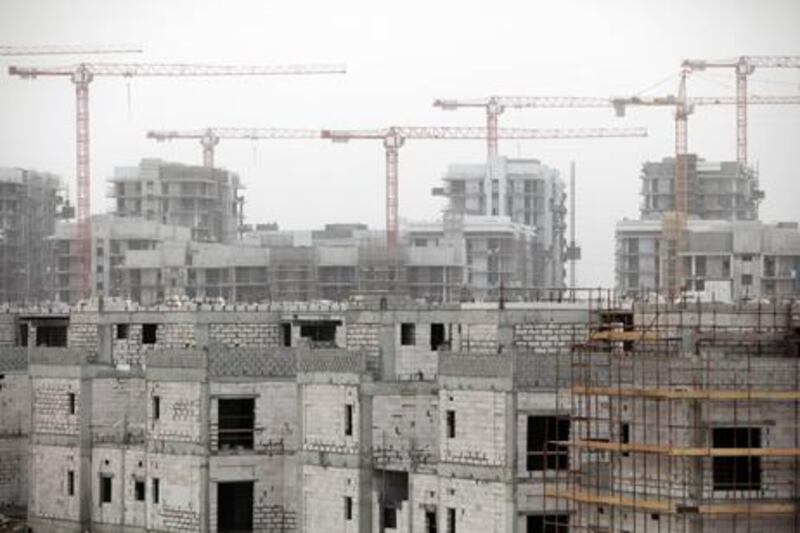ABU DHABI // A raft of developments including new homes, schools, roads and other vital infrastructure projects in Abu Dhabi will inject Dh330 billion into the economy over the next five years.
The massive investment, detailed for the first time yesterday by Abu Dhabi Executive Council, includes some projects already under way but many that are new.
"The noblest objective we can have is to ensure every citizen's welfare and stability," said Sheikh Mohammed bin Zayed, Crown Prince of Abu Dhabi and Deputy Supreme Commander of the Armed Forces. "As such, most of our efforts are geared to allow our sons to enjoy the benefits of development and help them contribute … to the overall development of the country."
Dh3bn in housing loans will be distributed to 1,500 citizens in the emirate. Nearly 6,500 such loans worth Dh13bn have been advanced in the past three years.
A total of 12,500 homes and villas in nine projects are planned, including 786 homes and plots of land in Al Ain and the Western Region.
Musanada, the building and general services arm of the Abu Dhabi Government, was assigned to appoint a contractor to implement the housing scheme. It includes the construction of villas, housing units, a mosque, roads, water, electricity and sewerage networks.
"It's very important and a part of the foundation that we grew up with," said Noura Al Kaabi, a member of the FNC in Abu Dhabi.
"This is what each individual and citizen is granted by the state. Whatever the project, the most important is the financial aspect and I think it's a wonderful and important step," Ms Al Kaabi said.
The Dh5.4 billion Watani project, which includes 703 villas in Khalifa City A for Emiratis, is expected to be completed in the second quarter of this year. Another major scheme in Al Ain's Al Ghareba area, comprising 600 villas, is estimated to be completed in the third quarter of this year along with the Sila'a housing project in the Western Region, which includes 448 villas, a mosque, school and women's centre.
Ms Al Kaabi said the housing projects were being "set in a way that is with the pace of the development and what's required".
Abu Dhabi Sewerage Services Company will start the first stage of its sewerage system network update in Abu Dhabi to increase its capacity and meet the demands of the new urban areas. The regions served will include Al Nahdha, Al Jadeedeh, Al Wathba, Bani Yas and Khalifa City B as well as Al Falah, Al Heeleyeh, Al Mua'zzaz, Al Shawamekh and Al Mafraq.
The main objective is to cover a large area of the emirate and gather waste water from the existing 12 pumping stations. A new single pumping station is already under construction.
A 41-kilometre tunnel with 43 kilometres of sub-tunnels is being built in the Dh5.7bn Strategic Tunnel Enhancement Programme, begun in 2009 and one of the longest gravity-driven wastewater tunnels in the world.
Other projects include the Mafraq-Al Ghwaifat road, the first 80 kilometres of which has been completed, with five intersections. Consultants and contractors will carry out the remaining three stages of the 328-kilometre road.
"It's important to develop Abu Dhabi and spending in the right areas makes sense," said Saleem Khokhar, head of equities at National Bank of Abu Dhabi. Mr Khokhar said Abu Dhabi was "definitely moving in the right direction and it gives a lot of upgrading that was required. They've been doing it in a very structured manner."
Al Ain and Abu Dhabi will have 15 new schools that can accommodate more than 15,600 pupils. The New York University in the capital, now 57 per cent complete, is expected to open next year.
And more than 5,000 new jobs will be created for Emiratis this year.
The Council also launched a project to establish manor complexes to help animal breeders who do not benefit from the government fodder subsidy programme. They will provide veterinary services, quarantine centres and markets for animal products.
Abu Dhabi Business Centre, an affiliate of the Department of Economic Development, is expected to open early this year to improve services to investors, businessmen and government institutions.
"There's far more focus now on what's required and what can benefit the economy," Mr Khokhar said. "It's a sensible, well thought-out move and, hopefully, it'll be in phases and not in one move.
"Abu Dhabi takes its time, it assesses and reassesses but I think it's all positive and it's something that they do need to do."






